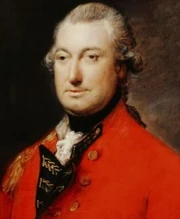
Charles Cornwallis (31 December 1738 – 5 October 1805) was the Lord Lieutenant of Ireland under Great Britain from 14 June 1798 to 27 April 1801, succeeding John Pratt and preceding Philip Yorke. Cornwallis is most famous for his role as a general in the American Revolutionary War, during which he commanded troops in the southern theater and was ultimately defeated at the Siege of Yorktown in 1781. He would redeem his failure by crushing the United Irishmen uprising of 1798 while serving as governor of Ireland, and would be made a marquess. Cornwallis was a member of the noble Cornwallis family, and he was the nephew of Lieutenant-General Edward Cornwallis and the older brother of Admiral William Cornwallis.
Biography[]

Another portrait of Lord Cornwallis
Charles Cornwallis was born on 31 December 1738 in London, England to an aristocratic family, the renowned Cornwallis family. Cornwallis was educated at Eton and Cambridge, and he was commissioned into the British Army in 1757, seeing action in the Seven Years' War. In 1762, he entered the House of Lords as Earl Cornwallis upon the death of his father, and in 1776 he was sent to the Thirteen Colonies during the American Revolutionary War, assuming command of a British army in the south under commander-in-chief Henry Clinton. Cornwallis crushed the Americans at the 1780 Battle of Camden, destroying Horatio Gates' army, and he won the Battle of Guilford Court House the next year, although he suffered heavy losses. General George Washington's army headed south from the siege of New York City to fight against Cornwallis' army, which was fighting Gilbert du Motier, Marquis de Lafayette's forces in Virginia; he was besieged at Yorktown on 6 October 1781 by the Americans on land and the French Navy at sea. After a week of battle, he was forced to surrender, and he was exchanged for Henry Laurens in December of that year. Cornwallis resumed his career back home in the British Isles, leading British forces in India during the Third Anglo-Mysore War of 1789-1792 against Mysore and serving as governor of Ireland at the time of the 1798 United Irishmen Rebellion. Cornwallis crushed the Irish rebellion and the French expedition to assist it, leading to the formation of the United Kingdom to unify Ireland with England, Scotland, and Wales. Cornwallis was sent to India, and he died in Gauspur, Benares State shortly after his arrival.
